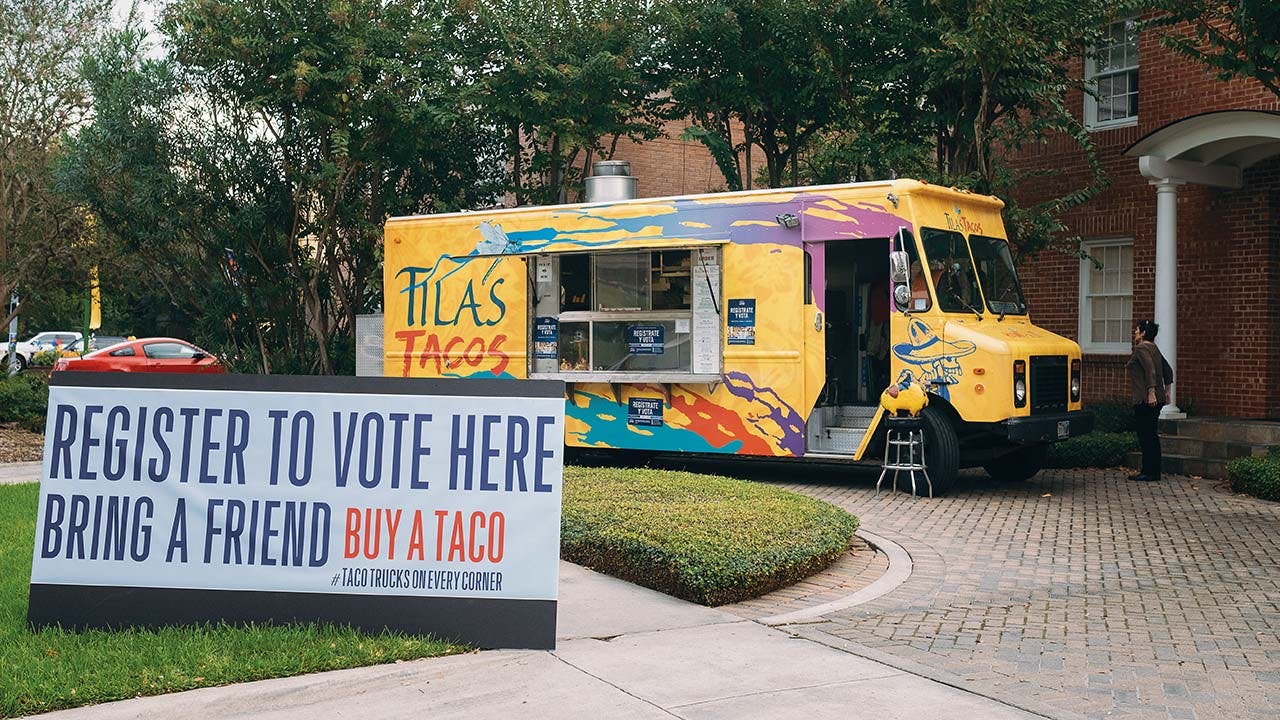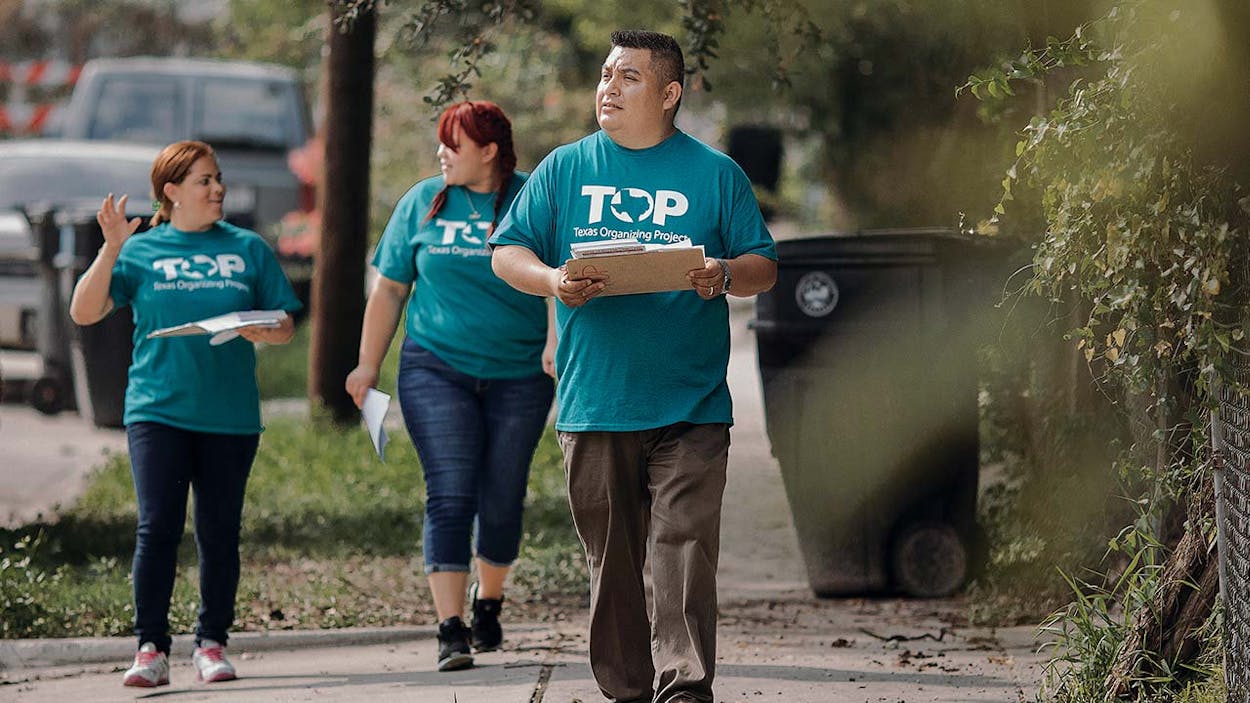“Buenas tardes.” Alain Cisneros stands at the gate of a yard in Houston’s East End, looking up at the modest brick house flanked by potted succulents. “Buenas tardes,” he calls again, adding the name of the resident voter, as though hollering at a friend who’s running a few minutes late. He gives the gate a shake. “I call this ‘pushy polite,’ ” he explains. “I use the example of my abuelita: you need to call her name and give her a minute to get to the door.”
The Houston air is thick with moisture and gnats. When Cisneros calls the woman’s name again, the door opens and she emerges, puzzled until she sees his teal Texas Organizing Project (TOP) shirt.
“Buenas tardes, señora, mi nombre es Alain Cisneros,” he says to her and continues in Spanish. “We’re knocking on the doors of registered voters who don’t get out to vote much. I’m here to ask what improvements you would like in your neighborhood.”
“Look at the potholes,” she replies in Spanish, gesturing to the street. “They never fix the broken sidewalks.”
“The tax assessor-collector can collect money for the upkeep of your neighborhood,” Cisneros says. “We’re supporting Ann Harris Bennett in this fall’s election. Do you know about the election coming up?”
“Yes,” she says. “It’s November 4.”
“It’s November 8,” he corrects her. “Let’s make a plan for when you will vote.” He hands her a “Count on Me” postcard showing the dates of early voting and asks her to choose when she’ll go to the polls. She circles the date, then writes her address on the postcard. TOP, a Houston-based nonprofit with a separate political action committee, will mail it to her as a reminder.
Cisneros gives her a flyer featuring the candidates whom TOP’s PAC has endorsed, including Harris Bennett and, for president, Hillary Clinton. The woman catches a glimpse of the other side of the flyer: a drawing of Donald Trump’s face behind a wall and the words “Insults/Prejudice/Hate.”
“You’re not going to tell me to vote for him!” she says, half-kidding.
“Never Trump,” he replies.
By the time he reaches the sidewalk, Cisneros is already updating the woman’s phone number in his iPod touch. He consults the list of the day’s addresses and, still looking at the onscreen map, strides toward the next house.
“People think I’m looking for Pokémon,” he says, “but I’m looking for voters.”
The untapped power of the Latino electorate is one of the enduring motifs of modern Texas politics. If only Hispanic voters could be persuaded to show up at the polls—so goes the narrative—the “sleeping giant” could turn Texas blue. Looking at the numbers, it’s easy to see why. About five million Texas Latinos—more than one quarter of the entire electorate—are eligible to vote. But their registration and turnout lag behind Texas as a whole. In 2012, according to Census data, only 39 percent of eligible Latino voters cast a ballot, compared with 54 percent of Texans overall.
TOP is trying to change those numbers. The organization, which focuses on issues that are important to local communities of color, has been working since 2009 to increase voter turnout among Latinos and blacks. As evidence of the group’s success, the director of electoral strategy, Crystal Zermeno, points to a 5 percent increase in the Latino share of the vote in Harris County between 2008 and 2012. Given Trump’s incendiary comments about Hispanics and immigrants, many expect that Latinos will be more motivated than ever to show up at their polling places this year. In the two months leading up to Election Day, TOP’s temporary staff—the group has 37 full-time employees—will call or visit 400,000 people in Harris County.
But Latino voter participation has remained modest because of factors far more complex than personal apathy. Latino voters are a young group, and young people generally turn out in lower numbers. Plus, many are first-, second-, or third-generation Americans who don’t have a family tradition of voting.
“For a lot of folks, partisanship or political behavior is something that’s passed down through their parents and grandparents,” says Victoria DeFrancesco Soto, an adjunct professor of Mexican American and Latino Studies at the University of Texas at Austin. “You don’t have that same custom in the Latino community.”
Nor are they accustomed to hearing from candidates, since campaigns usually invest resources in voters who have turned out regularly in the past. A recent poll found that 60 percent of the country’s registered Latino voters had not been contacted by any campaign, political party, or get-out-the-vote organization this cycle. In places like Houston, this is exacerbated by the fact that, as Lydia Camarillo, the vice president of the San Antonio–based Southwest Voter Registration Education Project (SVREP), puts it, “nobody cares about Texas.” Because it’s not a battleground state, Texas receives limited attention from national donors.
Texas also has some of the country’s most stringent laws regulating voter registration, requiring that voters register at least thirty days before the election. Still, SVREP predicts that more than two million Texas Latinos will vote this month—a 5 percent increase from 2012. To make sure that happens, groups like TOP are doing what research shows is most effective for engaging new voters: knocking on doors.

Cisneros, TOP’s Latino voter-engagement coordinator, has been block-walking for thirteen years: first with the community organizing group ACORN and then, beginning in 2010, with TOP (which itself was founded by former members of ACORN). The experience has helped him develop a keen eye for clues as he approaches each house. An NRA sticker on a car parked out front prepares him for the possibility of being turned away. A spot of oil centered in an empty driveway confirms no one is home. A blaring television tuned to Univision or Telemundo suggests the resident is a Spanish speaker and a naturalized citizen or first-generation American.
At one house, a woman watching her grandson tells Cisneros six times that she’s confused about the election. Her experience with politicians is that local candidates promised to fix the potholes in her street but never did, so eventually her husband fixed them himself.
“It’s because we don’t vote in big numbers—this is why people don’t pay attention to our neighborhoods,” Cisneros counters. She’s noncommittal. He moves on.
Cisneros, who is 37, immigrated from Mexico twenty years ago. Ironically, he has yet to cast his first vote; he holds permanent-resident status and hopes to become a citizen within four years. When he responded to a newspaper ad for ACORN organizers in 2003, he says, he’d seen too many injustices in the immigrant community where he lived; organizing helped channel his outrage into action. “What is more empowering, when you feel that you live on the outside, than helping others find their voice?” he says. Yet it frustrates him when an eligible voter is indifferent to the opportunity Cisneros himself lacks.
“Many politicians this year say, ‘If the Latinos don’t go out and vote against Donald Trump, maybe never again will politicians consider the Latino community,’ ” he says. “I don’t want to fail in that test.”
At the end of each doorstep conversation he mentions Trump’s name, often in the tone of a shared joke: “Just not Donald Trump, right?” At one apartment, a resident calls down from an upstairs window that she’s in a hurry and can’t talk. She needs to pick up her kids. Somehow, Cisneros gets her to come down and fill out a postcard. “Do you think Trump is the best for your kids?” he asks sternly. “No,” she says, smiling. But she doesn’t know where to vote. He tells her a canvasser will get her that information.
Trump comes up a lot in these conversations because “we believe an enemy is the best organizer,” Cisneros says. “The best thing that can happen is Donald Trump continues with his stupidity, saying a bunch of things. That’s good for us.”
Maybe. “Everybody assumes that because Trump is saying racist comments, we’re going to have the same boom that we saw in Arizona [where Sheriff Joe Arpaio’s anti-immigrant policies boosted Latino voter registration],” says SVREP’s Camarillo. “I’m not sure that it’s going to materialize at the levels that people think. Remember, Trump’s comments took place before the conventions, and people were not paying attention as closely.”
In fact, Zermeno says TOP may pivot to de-emphasize Trump in its get-out-the-vote efforts. “What we’re finding is that people don’t want to talk about the presidential race,” she says. “What they’re talking about is the local issues.” TOP’s next round of printed materials will probably feature something other than “Insults/Prejudice/Hate.”
As the sun slips lower in the sky, Cisneros enters a barbershop with metal bars across its windows. The walls are covered with Houston Rockets stickers, a collection of action figures still in the packages, and a giant poster of Snoop Dogg and Tupac Shakur.
The thirtysomething tattooed proprietor waves him over to the barber’s chair, where a man draped in a cutting cape sits in mid-shave.
Cisneros begins his spiel. “I’m from the Texas Organizing Project, and I’m asking people, What changes would you like to see in your neighborhood?”
“I hate to be mean, but less homeless people,” the barber says. “They cause a lot of problems.”
“You know that homeless people often have health problems and mental health problems, and they don’t have access to the care they need? And that Republicans in Texas have rejected the Medicaid expansion that would make it easier for these people to get care?”
“Uh-huh.” The barber tidies up his customer’s goatee.
“And if we vote for candidates who support improving access to health care, that will help the homeless situation.”
The barber looks up, now clear about Cisneros’s purpose. He shakes his head. “I’ve never voted, man. I don’t have time.”
“You have two weeks of early voting, plus twelve hours on Election Day.”
“I haven’t ever looked into who’d be good to vote for.”
Cisneros shows him the candidate slate. “These are the people who have the needs of our community in mind. You’re part of our community—we need you. Can you vote this year?”
The barber shrugs.
“Can you try?”
“I can try.”
Cisneros hands him a postcard, and the man circles a date and writes his address. They shake hands.
Outside, Cisneros enters the man’s information in his iPod. Where some might see a long shot, he sees a solid prospect.
“In the first part of the conversation, you feel like he doesn’t care, right?” Cisneros asks rhetorically. “ ‘Why do I need to vote? I never vote.’ But when you present the challenge—‘We need you, you are part of us, the community’s not voting in numbers like other communities’—he accepts the challenge.”
TOP, Cisneros makes clear, is running a long game. Maybe two more canvassers can convince the barber to vote this year. But if not, they’ll be back next year.
“Talking with people, we change minds,” he says. “He pretends he doesn’t care, but he cares. When people make a complaint, they care on some level.” Cisneros says he’s set himself a personal challenge: to go to the man’s polling place on his voting day and take a picture with him.
Rush-hour traffic begins to thin, and a small breeze stirs the exhaust-thickened air. Before he heads back to TOP headquarters to debrief his canvassers, Cisneros tallies his stats for the day: 25 houses visited. Twelve conversations. Six “Count on Me” cards. And the most important number, the one that shrinks no matter how hard he or any of his fellow organizers work: less than two months until the election.
Editor’s note: An earlier version of this piece included a quote from Alain Cisneros that incorrectly implied that the Harris County tax assessor-collector allocates tax monies. The quote has been fixed to reflect that the assessor-collector only collects such monies.
- More About:
- Politics & Policy
- Houston







